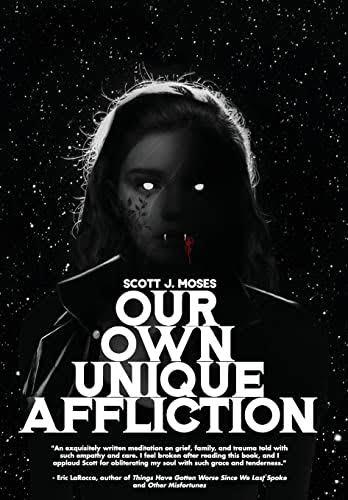You are here
Home › Books › Scott J. Moses's Vampire Novel 'Our Own Unique Affliction' Has Existential Bite ›Scott J. Moses's Vampire Novel 'Our Own Unique Affliction' Has Existential Bite
FTC Statement: Reviewers are frequently provided by the publisher/production company with a copy of the material being reviewed.The opinions published are solely those of the respective reviewers and may not reflect the opinions of CriticalBlast.com or its management.
As an Amazon Associate, we earn from qualifying purchases. (This is a legal requirement, as apparently some sites advertise for Amazon for free. Yes, that's sarcasm.)

Tales of vampires and their carnivorous ilk have spanned centuries and continents. The most commonly known legends in the Western world originate from Eastern Europe—the dreaded nosferatu of Slavic lore: a reanimated corpse, retaining its personality post-mortem, existent among the craven human herd, jealous of life and hungry for the blood pumping through our veins. From those benighted Transylvanian forests an archetype arose that has permeated every facet of popular culture, from books and movies, comics, video games, to the somber cemetery dirges of Gothic clubs and their related leather-and-lace fashions. The steely, hypnotic glare of Dracula and his varied progeny bewitches us as no other mythic monster has.
An uncountable number of vampire stories have been published since Bram Stoker’s seductive Count first appeared, covering every conceivable narrative scenario, so many it seems any possibility for innovation has been bled dry. It’s a sometimes daunting task, for both author and audience, to brave the pages of a new bloodsucker novel; the reader has certain expectations born of familiarity, but desires just enough variation to be surprised. That’s the literary tightrope Scott J. Moses walks with the DarkLit Press release of his introspective vampire opus, Our Own Unique Affliction.
Alice Ann and her sister Hannah Grace have existed since before the American Civil War, when a passing stranger murdered their Virginia farm parents and turned them into bloodthirsty nocturnal creatures. Ever after the siblings have been in the care of various ‘handlers’, humans in a tightly-knit underground society who, like Dracula’s Renfield, attend to a vampire’s every need in the hope they, too, will one day earn eternal life. Alice and Hannah’s current handler is Bodachi, a trucker who keeps his charges safe and shielded from the sun’s deadly rays in the back of his eighteen-wheeler in a perpetual nomadic road-trip. Each sister is haunted by memories of the past and the weight of years, but react to such negative stimuli very differently: Hannah, ever the ‘good’ sister, spends her endless days in quiet repose in Bodachi’s rig, while ‘bad girl’ Alice quells her existential frustration by hunting prey at nightclubs and bars. On one such outing, however, she encounters a man intoxicated on drugged vampire blood, and inadvertently learns of a conspiracy within the handler’s society led by one of Bodachi’s associates that seeks to free themselves from servitude by eliminating the vampires they attend. From that point forward, Alice, trapped, tortured, and starved of blood, must cope with loss and betrayal while figuring out a way to escape the oncoming dawn.
There are many things to enjoy about Our Own Unique Affliction. Moses’s prose is minimalist in the manner of Chuck Palahniuk, concise, exact and riven with disturbing yet engrossing internal discussions. Alice is the poster child for vampiric instability: she’s been undead so long, done so many things and visited so many places that past and present have coalesced into an indecipherable haze that only thickens once the side-effects of blood starvation set in. Moses excels at portraying her deteriorating mental state in a stream-of-consciousness style that bewilders in the best of ways, purposely forcing the reader to share Alice’s fugue, unsure of what’s real and what’s a delusional daydream.
That moody, contemplative atmosphere comes at a price, though: aside from Alice none of the remaining cast are fully-fleshed, three-dimensional shapes. Hannah, obviously an integral figure in Alice’s life—before and after their transformation—appears only rarely in flashbacks, and even Bodachi and the villainous Raeger are scarcely seen. That lack of characterization may have been purposefully engendered to keep the focus firmly fixed to Alice’s point-of-view: emotionally she’s a deep well, constantly ruminating about the nature of life, death and reality, but the ultimate outcome feels incomplete, a sketch rather than a detailed portrait. In this the novel’s brevity works against it: at only 136 pages, it’s a book that can be devoured in a single faithful sitting, but both characters and narrative would likely have benefited from a roomier telling. There’s a bounty of intriguing ideas presented in Our Own Unique Affliction, namely that of the clandestine handler society openly hiding among the humdrum workaday world, that aren’t thoroughly explored, and the ending seems hurried, even anticlimactic.
Despite its relentlessly downbeat tone, hope ultimately asserts itself, lending a strong positive note to an otherwise desolate tale. Heavy on reflection but light on action, Moses succeeds in quenching a reader’s vampire craving, but only just, and it's for that reason I’m compelled to grant Our Own Unique Affliction a 3 (out of 5) on my Fang Scale.


